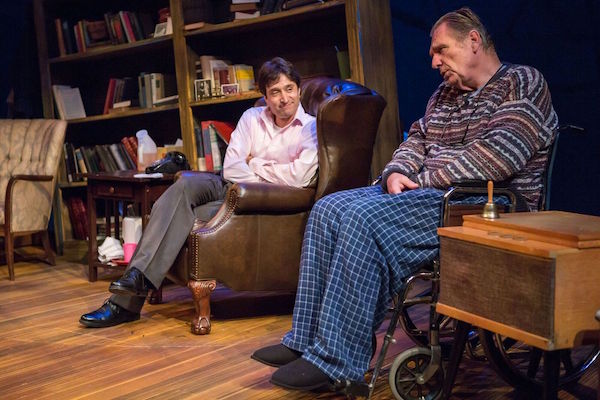
'Tuesdays With Morrie' tackles the serious subject of death with warmth, compassion, and a little humor
By Tina Farmer
The New Jewish Theatre takes a kinder, gentler look at impending death with its production of Tuesday's with Morrie, by Jeffrey Hatcher and Mitch Albom, from the book of the same title. Told in short vignettes that recall weekly visits between a professor and his prodigal student, the show mixes the intimacy of friendship rekindled with very real end of life issues and discomforts. Through each visit, another simple lesson of life and death that we too often fail to learn until our time on this planet begins to wane is revealed.
One night while channel surfing, sports journalist Mitch Albom stumbles upon an episode of Ted Koppel's Nightline that feature's Morrie Schwartz, Albom's nearly forgotten but favorite college professor. Schwartz and Koppel are discussing how Schwartz is dealing with his diagnosis of ALS, also known as Lou Gehrig's disease, and the death sentence that diagnosis indicates. Albom decides to look up his old professor and pay a visit, to say his last goodbyes. That visit leads to another and another, and eventually becomes Albom's regular Tuesday routine. As the audience, we watch with Albom as his mentor's health deteriorates before our eyes. Morrie's mind remains sharp but his body betrays him.
Andrew Michael Neiman is Albom, a man who has overscheduled and overcommitted his time, perhaps in an effort to avoid introspection and dealing with pains he doesn't feel capable of facing. Neiman wears Albom's contradictions and conflict easily, creating a thoroughly believable character that resonates as a busy contemporary professional. Neiman successfully navigates tone and conveys a genuine sense of humility, important during those scenes when the script veers towards self-congratulation.
James Anthony turns in a nuanced and effective performance as the professor, his physical interpretation of the ravages of ALS are beautifully wrought, if at times exceedingly difficult to watch. During the short show, Anthony shows us the many emotions and struggles that come with the realization of impending death, but his demeanor is always upbeat, looking for the humor or silver lining in a situation.
Cristie Johnston's set design subtly emphasizes the sense of things being "not quite right" that often comes with a diagnosis of ALS, dementia, and other diagnoses associated with aging. The bookshelf isn't quite right, the bed threatens to swallow and entrap Morrie, all the while Albom uncomfortably shifts and fumbles, overcompensating for feeling helpless by bringing food (that goes largely uneaten) to every visit. Michael Sullivan's lights, Sarah Azizo's props, and Michele Friedman Siler's costumes add appropriate touches, creating a sense of time and physicality operating just outside of normalcy. There's nothing remarkable here, but every now and again we're reminded of the serious state of limbo that is the story's reality.
The kind, sweet natured story is soft spoken and almost meditative, and largely succeeds in conveying the lessons Albom learned during his visits over the last few months of his beloved professor's life. The lessons are ones we've heard before, this time personified by a writer who is a bit of a showman, but genuinely kindhearted. Forgiveness, the need for self-reflection, and every small act of kindness are emphasized in the show, as is the importance of touch, of connection, with those we love.
The New Jewish Theatre delivers a warm and personable version of Tuesday's with Morrie, in performance through October 22, that feels like a long goodbye hug. Director Annamaria Pileggi skillfully guides the talented actors through the intimate exchanges, avoiding over-sentimentality and delivering grounded, sympathetic performances filled with humor. Though the show runs about 15 or 20 minutes longer than it needs to make its point, the story is engaging and ultimately, uplifting.


